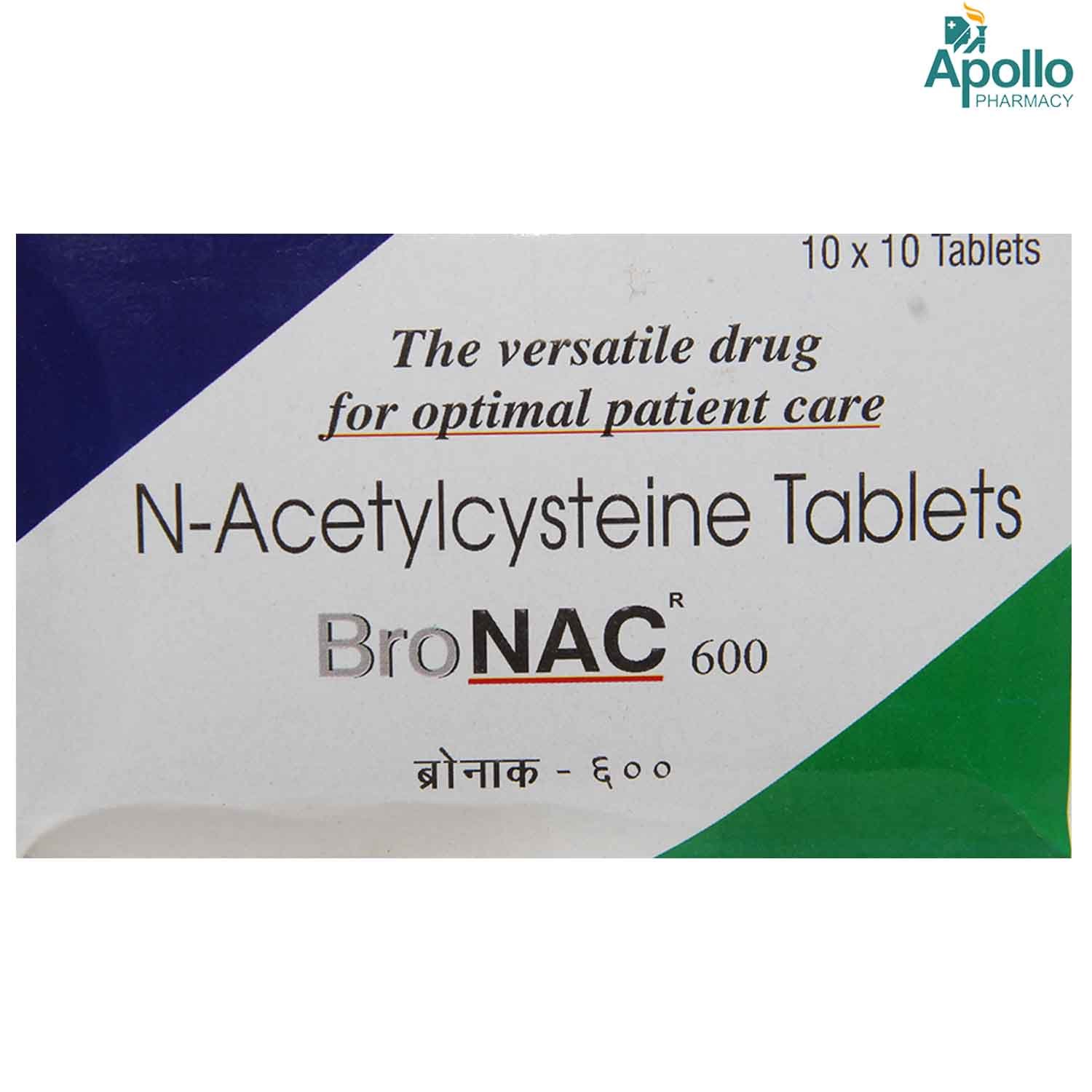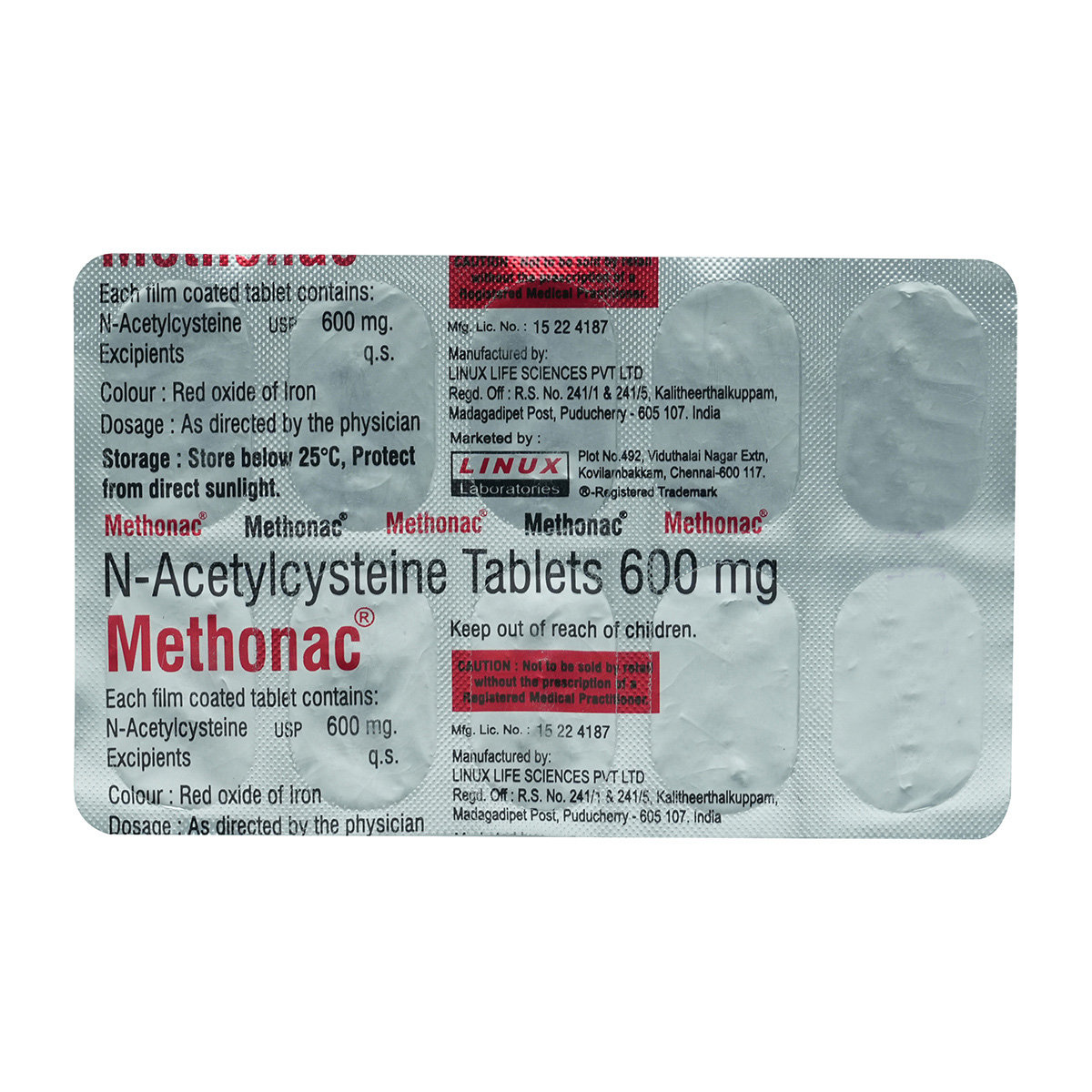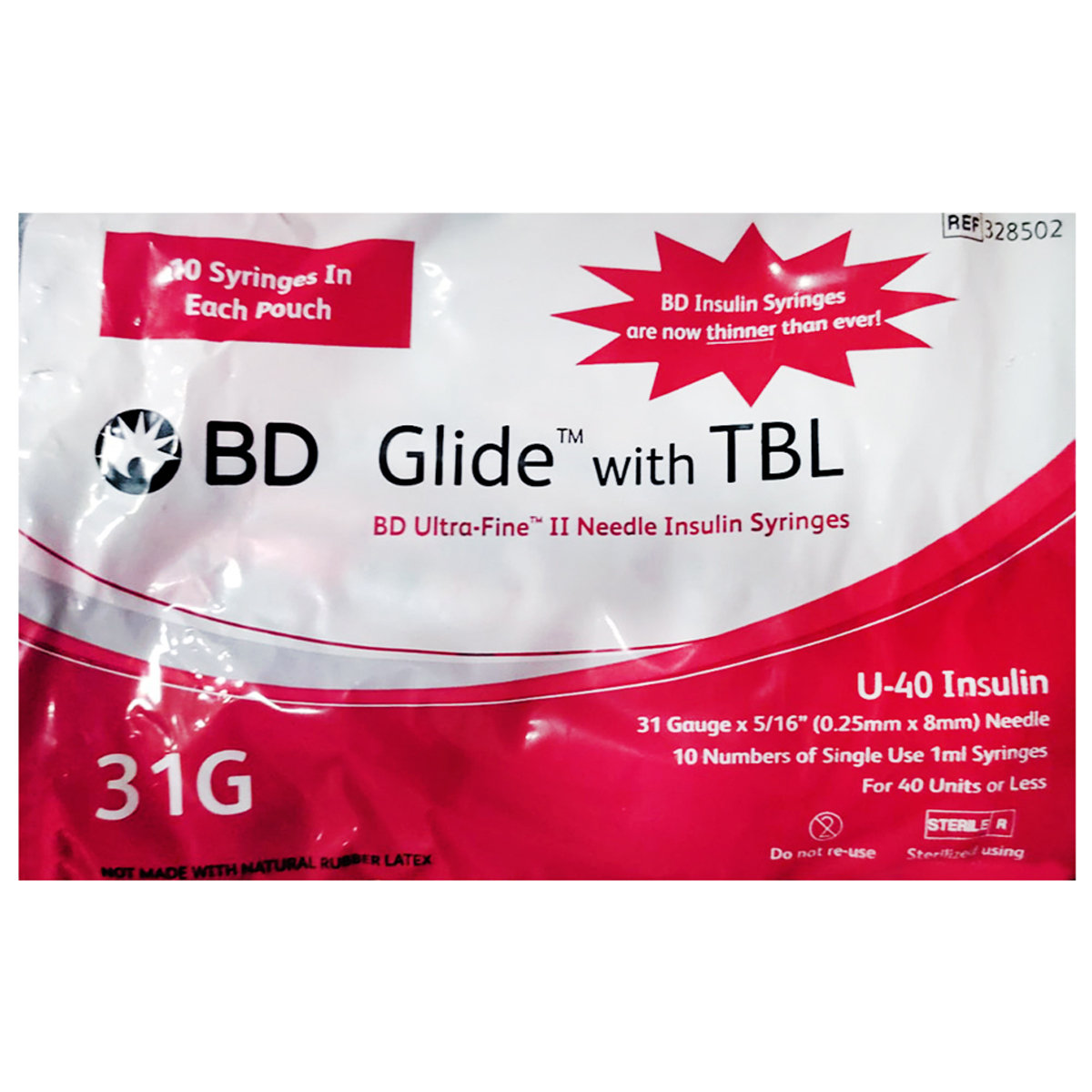Nacfil Tablet 10's
MRP ₹203
(Inclusive of all Taxes)
₹24.4 Cashback (12%)
Provide Delivery Location

secured payment

india's most trusted pharmacy

genuine products
Composition :
Manufacturer/Marketer :
Consume Type :
Expires on or after :
Return Policy :
About Nacfil Tablet
Nacfil Tablet belongs to a class of drugs called 'mucolytic agents' (cough/sputum thinner) primarily used to treat respiratory diseases associated with excessive mucus. Acute respiratory diseases are initially associated with dry, irritating cough, hoarseness in laryngitis (swelling of the voice box), or burning sensation in the chest due to bronchitis (swelling of the lining of bronchial tubes). Then, wet mucus forms, and continuous coughing out of sputum occurs. In chronic respiratory diseases, both dry irritating cough and wet cough with mucus occur.
Nacfil Tablet contains 'Acetylcysteine' that works by thinning and loosening phlegm (mucus) in the lungs, windpipe, and nasal passage. Thereby, making it easier to cough out phlegm.
Take Nacfil Tablet as prescribed. Your doctor will advise you on how often you take Nacfil Tablet based on your medical condition. Some people may experience nausea, vomiting, stomach upset, or fever. Most of these side effects of Nacfil Tablet do not require medical attention and gradually resolve over time. However, if the side effects persist or worsen, please consult your doctor.
If you are allergic to Nacfil Tablet or any other medicines, please tell your doctor. Nacfil Tablet is not recommended for children below 14 years of age. Drink plenty of fluids to thin mucus and lubricate your throat while taking Nacfil Tablet . When the bottle is opened, the liquid (syrup) colour may change and have a bad odor. This is normal, and it does not indicate that medicine has changed. Severe skin reactions such as Stevens-Johnson syndrome (a serious and rare disorder of skin and mucus membranes) or toxic epidermal necrolysis (skin blistering or skin peeling) have been rarely reported in some patients. However, if you notice any skin rash worsening with mucosal lesions or blisters, stop taking Nacfil Tablet and contact your doctor immediately. If you are pregnant or breastfeeding, please inform your doctor before taking Nacfil Tablet . If you have a history of stomach ulcers or have asthma inform your doctor before taking Nacfil Tablet .
Uses of Nacfil Tablet

Have a query?
Directions for Use
Key Benefits
Nacfil Tablet is a mucolytic agent (sputum thinner) used to treat acute (short term) and chronic (long term) respiratory diseases associated with excess mucus. Nacfil Tablet works by thinning and loosening phlegm (mucus) in the lungs, windpipe, and nasal passage. Thereby, making it easier to cough out phlegm. Nacfil Tablet is used in the treatment of conditions such as emphysema (shortness of breath), bronchitis (inflammation of mucous membranes in the airways), bronchiectasis (chronic widening of airway passage), and mucoviscidosis/cystic fibrosis (thick mucous clogs different parts of the body).
Storage
- Reduce salt intake to minimize fluid buildup.
- Use compression stockings, sleeves, or gloves.
- Gently massage the affected area towards the heart.
- Protect the swollen area from injury and keep it clean.
- Use lotion or cream to keep the skin moisturized.
- Report the itching to your doctor immediately; they may need to change your medication or dosage.
- Use a cool, damp cloth on the itchy area to help soothe and calm the skin, reducing itching and inflammation.
- Keep your skin hydrated and healthy with gentle, fragrance-free moisturizers.
- Try not to scratch, as this can worsen the itching and irritate your skin.
- If your doctor prescribes, you can take oral medications or apply topical creams or ointments to help relieve itching.
- Track your itching symptoms and follow your doctor's guidance to adjust your treatment plan if needed. If the itching persists, consult your doctor for further advice.
- Avoid trigger foods that can cause allergic reactions, such as nuts, shellfish, or dairy products.
- Keep a food diary to track potential food allergens.
- Include omega-3 rich foods like salmon and walnuts to reduce inflammation.
- Wear loose, comfortable clothing made from soft fabrics like cotton.
- Apply cool compresses or take cool baths to reduce itching.
- Use gentle soaps and avoid harsh skin products.
- Reduce stress through relaxation techniques like meditation or deep breathing.
- Contact your doctor immediately if you're experiencing a fast heart rate, palpitations, or other heart-related symptoms. This is crucial to determine whether the symptoms are related to your medication.
- Your doctor may need to adjust your medication regimen to alleviate the fast heart rate symptoms. This could involve changing the medication, reducing the dosage, or adding new medications to counteract the side effects.
- Follow your doctor's advice on monitoring your heart rate and blood pressure. This will help track any changes and ensure your heart rate returns normal.
- If you experience severe symptoms such as chest pain, dizziness, or shortness of breath, seek immediate medical attention. These symptoms can indicate a more serious condition that requires prompt treatment.
- Drink warm fluids such as warm water with honey, broth, soup or herbal tea to soothe sore throat.
- Gargle with warm salt water.
- Suck on lozenges to increase the production of saliva and soothe your throat.
- Use a humidifier to soothe sore throat as it adds moisture to the air and makes breathing easier.
- Consult your doctor if you experience skin redness, itching, or irritation after taking medication.
- Your doctor may adjust your treatment plan by changing your medication or providing guidance on managing your erythema symptoms.
- Your doctor may recommend or prescribe certain medications to help alleviate symptoms.
- Apply cool compresses or calamine lotion to the affected skin area to reduce redness and itching.
- Stay hydrated by drinking plenty of water to help alleviate symptoms and keep your skin hydrated.
- Monitor your skin condition closely and promptly report any changes, worsening symptoms, or concerns to your healthcare provider.
- Drink lots of water to thin mucus and make it easier to cough up.
- Take hot lemon and honey drink to soothe the cough.
- Rest to get enough sleep and Rest your voice and speak in a low voice.
- Use a cool mist vaporizer or humidifier.
- Take hot water in the shower for 10 to 15 minutes.
- Use saline nasal spray and a bulb syringe to help with congestion.
- Sore throat can be treated by gargling with hot salt water.
- Take a vitamin C by eating citrus fruits and fresh vegetables.
Drug Warnings
If you are allergic to Nacfil Tablet or any other medicines, please tell your doctor. Nacfil Tablet is not recommended for children below 14 years of age. Drink plenty of fluids to thin mucus and lubricate your throat while taking Nacfil Tablet . Severe skin reactions such as Stevens-Johnson syndrome (a serious and rare disorder of skin and mucus membranes) or toxic epidermal necrolysis (skin blistering or skin peeling) have been rarely reported in some patients. However, if you notice any skin rash worsening with mucosal lesions or blisters, stop taking Nacfil Tablet and contact your doctor immediately. If you are pregnant or breastfeeding, please inform your doctor before taking Nacfil Tablet . If you have a history of stomach ulcers or have asthma, inform your doctor before taking Nacfil Tablet .
Drug-Drug Interactions
Drug-Drug Interactions
Login/Sign Up
Drug-Food Interactions
Drug-Food Interactions
Login/Sign Up
Diet & Lifestyle Advise
- Avoid dairy products such as milk as it may increase mucus production. Also, avoid processed or refined foods to have relief from cough. Instead replace baked foods, fried foods, white bread, white pasta, French fries, sugary desserts and chips with green leafy vegetables.
- Drink plenty of fluids to avoid dry throat while you have a cough.
- Avoid citrus fruits as it may worsen the cough. Eat fruits that are rich in water content such as pears, watermelon, peaches and pineapples.
Habit Forming
Therapeutic Class
All Substitutes & Brand Comparisons
RX
Bronac 600 Tablet 10's
Healers Pharmaceuticals Pvt Ltd
₹145
(₹13.05 per unit)
26% CHEAPERRX
Oxitres Tablet 10's
Steadfast MediShield Pvt Ltd
₹187.5
(₹16.88 per unit)
5% CHEAPERRX
Methonac Tablet 10's
Linux Laboratories Pvt Ltd
₹203
(₹18.27 per unit)
2% COSTLIER
Alcohol
Safe if prescribed
Interaction of alcohol with Nacfil Tablet is unknown. Please consult a doctor before consuming alcohol with Nacfil Tablet .
Pregnancy
Consult your doctor
Nacfil Tablet is a Category B pregnancy drug. However, it is given to pregnant women only if the doctor thinks benefits outweigh risks.
Breast Feeding
Consult your doctor
It is unknown whether Nacfil Tablet is excreted in human milk. Nacfil Tablet is given to breastfeeding mothers only if the doctor thinks benefits are greater than risks.
Driving
Safe if prescribed
Nacfil Tablet usually does not affect your ability to drive or operate machinery.
Liver
Consult your doctor
Please consult a doctor if you have any concerns regarding the use of Nacfil Tablet in patients with liver problems.
Kidney
Consult your doctor
Please consult a doctor if you have any concerns regarding the use of Nacfil Tablet in patients with Kidney problems.
Children
Safe if prescribed
Nacfil Tablet is not recommended for children below 14 years of age. Please consult a doctor before giving Nacfil Tablet to children.
FAQs
Nacfil Tablet contains Acetylcysteine that belongs to the class of mucolytic agents (cough/sputum thinner). It works by thinning and loosening phlegm (mucus) in lungs, windpipe and nose. Thereby, helps to cough out easily.
You are recommended to avoid histamine rich foods such as tomatoes, wine and processed foods as it may cause histamine intolerance by affecting the way histamine is broken down in the body leading to symptoms such as flushing (redness of the skin), migraine headaches, skin rash, itching and rhinitis (runny and stuffy nose). Therefore, if you are allergic to histamine or cannot tolerate food and drinks rich in histamine, please inform your doctor before taking Nacfil Tablet .
You are not recommended to take Nacfil Tablet with antibiotics such as tetracycline, amoxicillin, amikacin and gentamicin at the same time as it may reduce the effectiveness of antibiotics. However, if you are supposed to take these medicines together, maintain a time gap of minimum of 2 hours between taking Nacfil Tablet and antibiotics. However, please consult a doctor before using Nacfil Tablet with antibiotics or any other medicines.
You are recommended to take Nacfil Tablet for as long as your doctor has prescribed it. However, if the symptoms worsen or persist after 1 week of using Nacfil Tablet , please consult your doctor.
You are not recommended to stop taking Nacfil Tablet without consulting your doctor as it may worsen cough or cause recurring symptoms. Therefore, take Nacfil Tablet for as long as your doctor has prescribed it, and if you experience any difficulty while taking Nacfil Tablet , please consult your doctor.
Country of origin
Manufacturer/Marketer address
Disclaimer
Author Details
We provide you with authentic, trustworthy and relevant information













